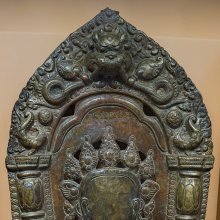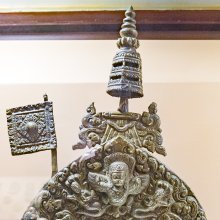Ishtadevata, Iṣṭa-devatā, Iṣṭa-deva, Ishta-devata, Ishtadeva, Iṣṭadeva: 11 definitions
Introduction:
Ishtadevata means something in Hinduism, Sanskrit, Marathi. If you want to know the exact meaning, history, etymology or English translation of this term then check out the descriptions on this page. Add your comment or reference to a book if you want to contribute to this summary article.
The Sanskrit terms Iṣṭa-devatā and Iṣṭa-deva and Iṣṭadeva can be transliterated into English as Ista-devata or Ishta-devata or Ista-deva or Ishta-deva or Istadeva or Ishtadeva, using the IAST transliteration scheme (?).
Images (photo gallery)
In Hinduism
Purana and Itihasa (epic history)
Source: archive.org: Shiva Purana - English TranslationIṣṭadeva (इष्टदेव) refers to “one’s own favourite deity”, according to the Śivapurāṇa 2.1.12, while explaining details of worship:—“[...] the root of devotion (bhakti) is good action (satkarma) and the worship of one’s own favourite deity (iṣṭadeva). The root of that is the good preceptor. A good preceptor (sadguru) is secured only through association with good people (satsaṃgati). If one associates with good people, one will come across a preceptor. From the preceptor mantras and the modes of worship can be learned. Bhakti (devotion) is generated by worship and it gives birth to knowledge”.

The Purana (पुराण, purāṇas) refers to Sanskrit literature preserving ancient India’s vast cultural history, including historical legends, religious ceremonies, various arts and sciences. The eighteen mahapuranas total over 400,000 shlokas (metrical couplets) and date to at least several centuries BCE.
Vaishnavism (Vaishava dharma)
Source: Pure Bhakti: Brhad BhagavatamrtamIṣṭadeva (इष्टदेव) refers to:—One’s worshipable Deity. (cf. Glossary page from Śrī Bṛhad-bhāgavatāmṛta).

Vaishnava (वैष्णव, vaiṣṇava) or vaishnavism (vaiṣṇavism) represents a tradition of Hinduism worshipping Vishnu as the supreme Lord. Similar to the Shaktism and Shaivism traditions, Vaishnavism also developed as an individual movement, famous for its exposition of the dashavatara (‘ten avatars of Vishnu’).
General definition (in Hinduism)
Source: WikiPedia: HinduismWithin Hinduism, an Ishta-deva (iṣṭa-deva(tā). lit "cherished divinity") is a term denoting a worshipper's favourite deity. The compound is composed of the words iṣṭa "desired, liked, cherished" and devatā "godhead, divinity, tutelary deity" or deva "deity".
Languages of India and abroad
Marathi-English dictionary
Source: DDSA: The Molesworth Marathi and English Dictionaryiṣṭadēvatā (इष्टदेवता).—f (S) iṣṭadaivata n (S) A tutelar deity or patron-saint.
Source: DDSA: The Aryabhusan school dictionary, Marathi-Englishiṣṭadēvatā (इष्टदेवता).—f daivata n A tutelar deity.
Marathi is an Indo-European language having over 70 million native speakers people in (predominantly) Maharashtra India. Marathi, like many other Indo-Aryan languages, evolved from early forms of Prakrit, which itself is a subset of Sanskrit, one of the most ancient languages of the world.
Sanskrit dictionary
Source: DDSA: The practical Sanskrit-English dictionaryIṣṭadeva (इष्टदेव).—a favourite god, one's tutelary deity.
Derivable forms: iṣṭadevaḥ (इष्टदेवः).
Iṣṭadeva is a Sanskrit compound consisting of the terms iṣṭa and deva (देव). See also (synonyms): iṣṭadevatā.
--- OR ---
Iṣṭadevatā (इष्टदेवता).—a favourite god, one's tutelary deity.
Iṣṭadevatā is a Sanskrit compound consisting of the terms iṣṭa and devatā (देवता). See also (synonyms): iṣṭadeva.
Source: Cologne Digital Sanskrit Dictionaries: Shabda-Sagara Sanskrit-English DictionaryIṣṭadeva (इष्टदेव).—m.
(-vaḥ) A tutelary deity, one particularly worshipped. E. iṣṭa and deva a deity.
--- OR ---
Iṣṭadevatā (इष्टदेवता).—f.
(-tā) A person’s chosen or tutelary. 2. divinity. E. iṣṭa and devatā divinity.
Source: Cologne Digital Sanskrit Dictionaries: Monier-Williams Sanskrit-English Dictionary1) Iṣṭadeva (इष्टदेव):—[=iṣṭa-deva] [from iṣṭa > iṣ] m. ([cf. Lexicographers, esp. such as amarasiṃha, halāyudha, hemacandra, etc.]) a chosen tutelary deity, favourite god, one particularly worshipped (cf. abhīṣṭa-devatā).
2) Iṣṭadevatā (इष्टदेवता):—[=iṣṭa-devatā] [from iṣṭa > iṣ] f. a chosen tutelary deity, favourite god, one particularly worshipped (cf. abhīṣṭa-devatā). cf. [Religious Thought and Life in India xiv; 370 ]etc.
Source: Cologne Digital Sanskrit Dictionaries: Yates Sanskrit-English DictionaryIṣṭadeva (इष्टदेव):—[iṣṭa-deva] (vaḥ-vatā) 1. m. f. A tutelary deity, a chosen god.
[Sanskrit to German]
Sanskrit, also spelled संस्कृतम् (saṃskṛtam), is an ancient language of India commonly seen as the grandmother of the Indo-European language family (even English!). Closely allied with Prakrit and Pali, Sanskrit is more exhaustive in both grammar and terms and has the most extensive collection of literature in the world, greatly surpassing its sister-languages Greek and Latin.
See also (Relevant definitions)
Partial matches: Ishta, Deva, Devata, Teva.
Ends with: Abhishtadevata.
Full-text: Upasana, Mangalacarana, Abhishtadevata, Ishvara, Grihadevata, Sadguru, Satkarman, Guhyeshvari, Bhava, Kumaramani, Chandodipika, Waterhole.
Relevant text
Search found 28 books and stories containing Ishtadevata, Ishta-deva, Ishta-devata, Ishta-devata, Ishtadeva, Iṣṭa-deva, Ista-deva, Iṣṭa-devatā, Ista-devata, Iṣṭadeva, Istadeva, Iṣṭadēvatā, Iṣṭadevatā, Istadevata; (plurals include: Ishtadevatas, devas, devatas, Ishtadevas, devatās, Iṣṭadevas, Istadevas, Iṣṭadēvatās, Iṣṭadevatās, Istadevatas). You can also click to the full overview containing English textual excerpts. Below are direct links for the most relevant articles:
Saint Thyagaraja's Pancha Ratna Kritis < [October - December 1972]
Kalidasa and Nature < [January-February 1935]
Kalidasa and Nature < [July – Sept. & Oct. – Dec. 1992]
Brihad Bhagavatamrita (commentary) (by Śrī Śrīmad Bhaktivedānta Nārāyana Gosvāmī Mahārāja)
Verse 2.1.92 < [Chapter 1 - Vairāgya (renunciation)]
Verse 1.2.98 < [Chapter 2 - Divya (the celestial plane)]
Verse 2.4.269 < [Chapter 4 - Vaikuṇṭha (the spiritual world)]
Shat-cakra-nirupana (the six bodily centres) (by Arthur Avalon)
Later Chola Temples (by S. R. Balasubrahmanyam)
Temples in Chidambaram < [Chapter VI - Temples of Kulottunga II’s Time]
Bhajana-Rahasya (by Srila Bhaktivinoda Thakura Mahasaya)
Text 4 < [Chapter 7 - Saptama-yāma-sādhana (Pradoṣa-kālīya-bhajana–vipralambha-prema)]
Lord Jhulelal: An Analytical Study (by Thakkar Harish Gopalji)
Part 9 - Aim and Scope < [Chapter 1 - Introduction]
Part 7 - Monotheism or Polytheism < [Chapter 4 - Analysis]
Part 4 - Preparation of a questionnaire < [Chapter 3 - Research Methodology]
Related products



